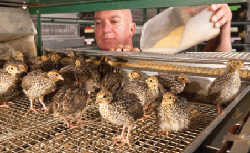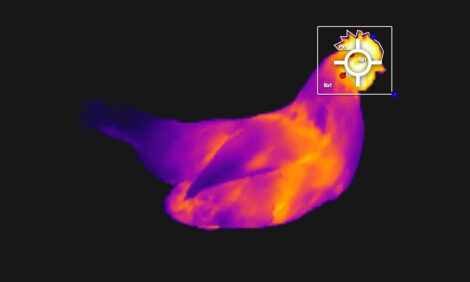



Organic Poultry's Special Needs for Healthy Growth
Researchers at the USDA Agricultural Service are looking at yeast products and organic acids to control potential foodborne disease pathogens in organic poultry.To conduct research that may be beneficial to the organic industry, ARS has a new state-of-the-art organic poultry research facility that was developed collaboratively between an ARS unit in Fayetteville, Arkansas, and the University of Arkansas. The facility not only meets the livestock requirements of the US Department of Agriculture National Organic Program (NOP), but also the animal welfare recommendations for poultry by the National Organic Standards Board and the Organic Poultry Guidance Document of the Accredited Certifiers Association.

In the United States, organic poultry production has increased almost 20 per cent annually since the establishment of the NOP in 2002. This program accredits private businesses, organisations, and state agencies to certify producers and handlers of agricultural products according to NOP regulations. (The Fayetteville farm was certified under Nature's International Certification Services.) Organic poultry farms can only use compounds on the national list of substances allowed for organic production. Their use of antibiotics and other drugs and pesticides available to conventional poultry producers is restricted or prohibited. Alternatives to antibiotics are also needed for conventional poultry production, since regulations for antibiotic use are being tightened in response to the prevalence of antibiotic resistance in pathogens.
Microbiologist Gerry Huff at ARS's Poultry Production and Product Safety Research Unit (PPPSRU) in Fayetteville has investigated yeast extracts as alternatives to antibiotics for controlling disease-causing bacteria in turkey poults. Details of the study can be found in a paper published in 2010 in Poultry Science.
Dr Huff explained: "Organic, natural remedies and preventatives are particularly needed for organic poultry production. Our lab has been studying the effects of yeast extract as an immune stimulant and alternative to antibiotics in conventional turkeys. Initial studies suggest that dietary yeast extract has good potential as a non-antibiotic alternative for decreasing pathogens in organic turkey production. We need a larger study to confirm its efficacy. But it is expensive to work with turkeys – they eat a whole lot – so we are now using yeast extract in Japanese quail studies to test its efficacy against Salmonella and Campylobacter. We're using quail as a model system to evaluate natural treatments that will be beneficial for chicken and turkey production."
Dr Huff's current study, in collaboration with Irene Wesley at NADC, involves 800 Japanese quail – a number they could not do with turkeys. Yeast extracts help boost the immune system's ability to kill bacteria but there is a downside.
"Yeast ramps up certain aspects of the immune response but this can decrease body weight in some individuals," says Dr Huff. "Weight gain is suppressed because the energy normally used for growth is redirected toward the immune system. We need to balance the two effects of adding yeast extracts to turkey feed."
PPPSRU research leader, Annie Donoghue, is looking at an integrated systems approach to reducing Salmonella and Campylobacter in organic and all-natural poultry.
Because drugs are not permitted in organic production, mortality may be higher than in conventional poultry operations.
Dr Donoghue said: "Food safety concerns with Salmonella and Campylobacter are high-priority areas for organic poultry producers, and strategies that promote gut health, limit disease, and prevent foodborne infections are needed."
Working collaboratively with professors Kumar Venkitanarayanan at the University of Connecticut and Dan Donoghue at the University of Arkansas, she found that caprylic acid, naturally found in milk and coconut oil, has efficacy against these foodborne pathogens when fed to poultry.
These studies were published in Poultry Science (January 2009) and the Journal of Food Protection (April 2009).
April 2011








